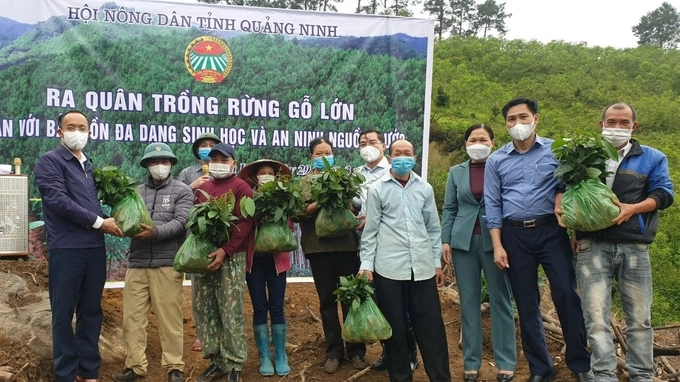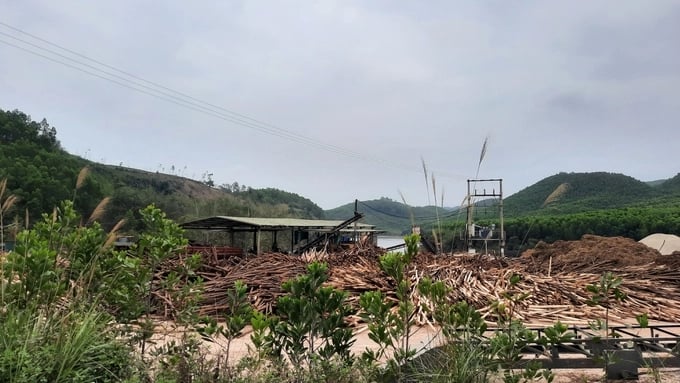May 24, 2025 | 16:24 GMT +7
May 24, 2025 | 16:24 GMT +7
Hotline: 0913.378.918
May 24, 2025 | 16:24 GMT +7
Hotline: 0913.378.918

Quang Ninh province concentrates resources on planting new large timber forests. Photo: Nguyen Thanh.
Quang Ninh has a total natural area of 617,779ha, of which forest and forestry land accounts for nearly 70% of the province's natural area. The forest cover remains stable at 55%. The forest ecosystem is rich and diverse, including on land, in coastal areas, and on islands.
This is an advantage for the province to promote the development of the forestry industry, especially large timber plantations. Consequently, it makes an important contribution to sustainable socio-economic development. It also ensures national defense and security in border areas, mountainous areas, and islands.
Every year, Quang Ninh province allocates at least 3% of the total regular budget expenditure for forestry development. In particular, on November 28, 2019, the Standing Board of the Provincial Party Committee issued Resolution 19-NQ/TU on sustainable forestry development in Quang Ninh province to 2025, with a vision for 2030.
For example, Ba Che district has developed a project to develop large timber forests in the area in the period 2019-2025. Accordingly, by 2025, a large timber area of 5,000 ha will be formed and stably developed. The project is expected to create a material area to meet production and deep processing. The project is also expected to increase the value of wood and non-timber forest products for domestic consumption and export.
With the support of agencies and businesses, Ba Che has accelerated the planting of large timber forests and indigenous trees in accordance with the provisions of the law, ensuring efficiency and a timely planting season. Along with that is the inspection, supervision, and guidance of forest owners in the implementation of afforestation in the area with proper techniques. This also includes the density of planting, fertilizing, tending, and protecting planted forests to ensure forest formation.
Aside from Ba Che, many localities across the province have also focused on implementing, achieving high rates such as Tien Yen, Van Don, Hai Ha... Consequently, the forestry industry in Quang Ninh has made positive changes toward a more sustainable direction.
In the period of 2020 - 2021, the whole province planted 23,738 hectares of concentrated forests, including 1,473 ha of large timber forests. Production value reached more than VND 1,200 billion/year (increasing by nearly 10% compared to the period of 2018-2019); exploiting and consuming 1,086,815m3/year (an increase of nearly 20% compared to the period of 2018-2019). This is an increase of 14% compared to the annual target in the spirit of Resolution 19-NQ/TU); the average income of forestry workers is over VND70 million/year.
Quang Ninh is a province with a gateway to trade with China through Mong Cai international border gate and belongs to the economic corridor Hanoi - Hai Phong - Quang Ninh. Quang Ninh has many advantages for economic and social development in general and the forestry industry in particular and has favorable conditions for exporting agricultural and forestry products.

The wood products of Quang Ninh province are still mainly woodchips and semi-woodchips. Photo: Nguyen Thanh.
Currently, the wood products of Quang Ninh province are still modest and low value, the main product is still chopped and semi-woodchips. Quang Ninh province has many solutions to attract investment to increase the value of products, putting new technology lines into processing wood products for domestic and export.
Mr. Vu Duy Van, Deputy Director of the Quang Ninh Department of MARD, said that functional agencies are completing mechanisms and policies to support capital and land. The Department is also implementing scientific and technological advances in the production and processing of wood and non-timber forest products.
The Department is building and supporting mechanisms for the chain link in wood processing with the nucleus of furniture factories in industrial clusters/zones. The Department is also building and supporting a chain linking NTFPs with a number of key non-timber forest products of the province.
Develop a number of policies to support wood processing establishments moving into clusters/industrial parks such as exemption and reduction of ground rent; support for relocation and installation, and financial support for production time off due to moving. This also includes stimuli and incentives for medium and large-scale wood processing businesses, export furniture manufacturing enterprises, MDF, and WPC to set up cluster factories/industrial parks.
According to Mr. Van, the province will promote the transfer and application of environmentally friendly methods and technology to utilize waste forest products. This also includes advanced technology, automation technology, digitization in forest product processing, digitization in production, and business management and marketing.
Support enterprises to link, cooperate, and apply science and technology to meet the needs of technological innovation. Support training and education on information technology, building and applying certificates of the chain of custody of products.
In addition, priority should be given to land for wood processing enterprises, especially raw material storage, and warehousing areas. Invest in infrastructure, especially roads, electricity, and water for areas with abundant raw materials to attract investments in wood processing in this area.
Building an auxiliary system for the forest product processing industry as soon as possible in the direction of upgrading and expansion. Constructing service houses for workers in the forest product processing industry.
Apply technical solutions to improve the quality of varieties and timber from planted forests to meet the requirements of furniture production fields, and develop seed production areas for each type. From there, form a mechanism to create cooperation and association between enterprises producing, processing, and exporting wood products and forest growers to improve productivity and quality of planted forest timber. Limit and proceed to stop the export of wood chips.
Translated by Hoang Duy

(VAN) The People's Committee of Tra Vinh province has approved an adjustment to the investment policy for the Green Hydrogen Plant project, increasing its area to approximately 52.76 hectares.
![Reducing emissions from rice fields: [2] Farmers’ commitment to the soil](https://t.ex-cdn.com/nongnghiepmoitruong.vn/608w/files/news/2025/05/05/dsc08881jpg-nongnghiep-140632.jpg)
(VAN) Clean rice cultivation model in Thuong Tan commune, Bac Tan Uyen district, is assisting local residents in achieving sustainable agriculture by substantially reducing costs, increasing productivity, and protecting the environment.

(VAN) At the conference to disseminate Resolution No. 68, AgriS introduced its digital agricultural ecosystem and reaffirmed its commitment to accompanying the Government in promoting private sector development and sustainable agriculture.

(VAN) 'Blue Ocean - Blue Foods' initiative is designed to restore marine ecosystems and establish sustainable livelihoods for local communities by cultivating a minimum of 1,000 hectares of cottonii seaweed in the first three years.
/2025/05/21/4642-3-112707_603.jpg)
(VAN) The V-SCOPE project has made direct contributions to three out of six pillars of the Comprehensive Strategic Partnership between Vietnam and Australia.

(VAN) Facing the threat of rabies spreading to the community, Gia Lai province urgently carries out measures to vaccinate dogs and cats on a large scale.

(VAN) Disease-free livestock farming not only protects livestock herds but also stabilizes production and livelihoods for many farmers in Tuyen Quang.